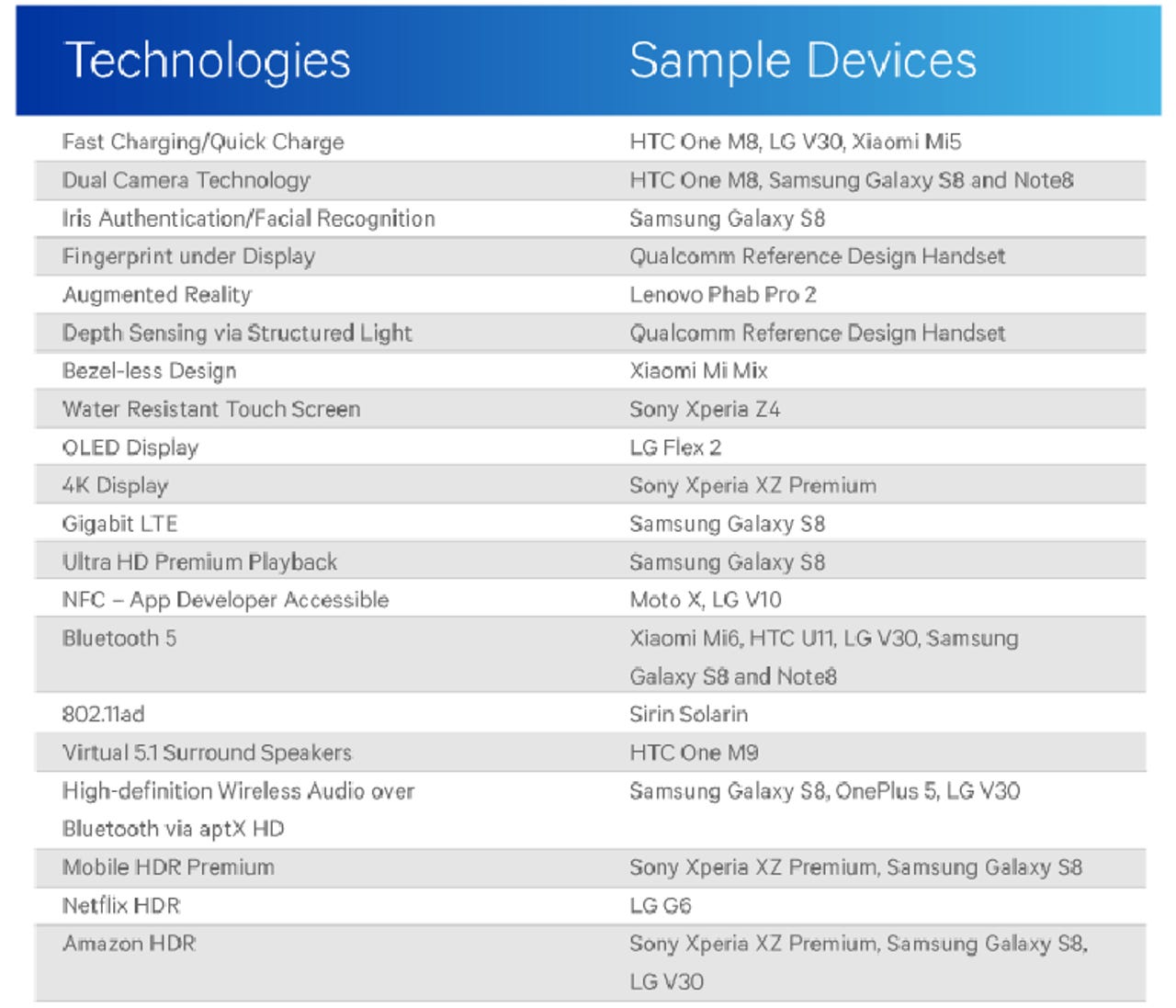Apple iPhone innovative? No, it's Android that leads for world firsts, says Qualcomm


Qualcomm's list of world firsts on Android sets out the technologies and the mobile devices that used them.
iPhon
Ahead of Apple's 10th anniversary iPhone launch, Qualcomm has laid out a list of features powered by its technology on Android phones that arrived before the iPhone.
Qualcomm's list of firsts for the smartphone industry is basically a roundup of features rumored to be in the iPhone 8, iPhone 8 Plus, and higher-end iPhone X.
The Android firsts that Qualcomm counts cover bezel-free designs, dual cameras, augmented reality, depth sensing, and OLED displays -- features that have appeared separately across a dozen Android phones over the past few years.
"Qualcomm Technologies has enabled some notable world firsts on Android, and some remain Android exclusives to this day," it boasts.
Though Qualcomm's post doesn't mention Apple by name, the company suggests it can take credit for some the features in the iPhone.
"Inventions from Qualcomm lay the foundation for so many technologies and experiences we value in our smartphones today -- on Android and other platforms."
The first technology it references is super-fast Gigabit LTE, which is a nod to Apple and Qualcomm's ongoing legal spat over licensing fees.
Apple uses modems from both Intel and Qualcomm in iPhones but reportedly decided, for consistency's sake, not to enable Gigabit LTE in iPhones with Qualcomm's modem until Intel chips have the same capability.
But if you want Gigabit LTE now, Qualcomm suggests getting a Samsung Galaxy S8.
"We've been inventing foundational technologies for Gigabit LTE for well over a decade," Qualcomm says. "Our model is to make our inventions available as broadly as possible to the mobile industry through our licensing program, from startups to global companies."
Related to Apple's effort to shrink the bezels on the iPhone, Apple has developed a face-recognition system for the iPhone X, dubbed FaceID, which uses a 3D or depth-perception sensor.
Qualcomm points out that the first bezel-less design came in Xiaomi's 2016 Mi Mix, which has since been taken up widely in the industry. It also takes credit for enabling the bezel-less design in Essential's new phone.
Meanwhile, Qualcomm attributes industry firsts in using depth sensing via structured light and placing a fingerprint scanner under the display -- which Apple reportedly was unable to achieve -- to two Qualcomm "reference design" handsets.
As for augmented reality, Qualcomm points to Lenovo's Phab Pro 2, which supported Google's Tango platform, as a first. This phone however lost relevance after Google released its answer to Apple's ARKit for iOS 11, ARCore, which enables AR on all Android phones without needing the extra sensors.
Overall Qualcomm's post reads like a counter-argument to claims by Apple that Qualcomm charges too much for its licensing fees and FTC's antitrust suit against Qualcomm over monopolistic behavior, which Intel and Samsung filed briefs for to oppose Qualcomm's efforts to have the case thrown out.
Qualcomm says it helps "countless companies across the globe to commercialize our inventions at both speed and scale, and with a choice for consumers on price points and features".
It also highlights that it's worked with Google, Samsung, LG, HTC and Motorola-Lenovo while helping new entrants such as China-based Oppo and Vivo become major players in the worldwide smartphone market.
"The vibrant Android ecosystem is built on Qualcomm inventions and our industry-enabling horizontal model," it said.
Previous and related content
Why I'm now using Android and might skip the iPhone 8
Beyond the iPhone: How Apple is positioning itself for the next big thing
The new iPhone will grab the spotlight, but Apple's other moves are even more interesting.
Samsung Galaxy Note 8: My first week with a nearly perfect smartphone
After last year's Note 7 fiasco, we weren't sure how Samsung and Note fans would respond. The Note 8 is a stunning phone and Note lovers are sure to appreciate the S Pen functionality, dual camera performance, and more.
More on Android and smartphones
- What does Google know about you? Its new privacy dashboard should reveal all
- iPhone 8 could be bad news for Android handset makers
- Nokia goes Android 8.0 Oreo: Upgrade confirmed for all new smartphone models
- Android Oreo bug: Phones using mobile data even when Wi-Fi is available
- Top Android phones for those with iPhone envy